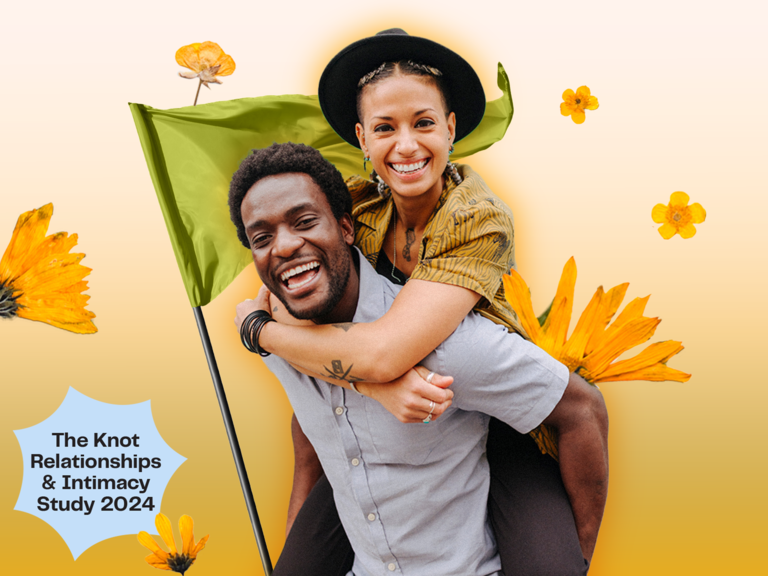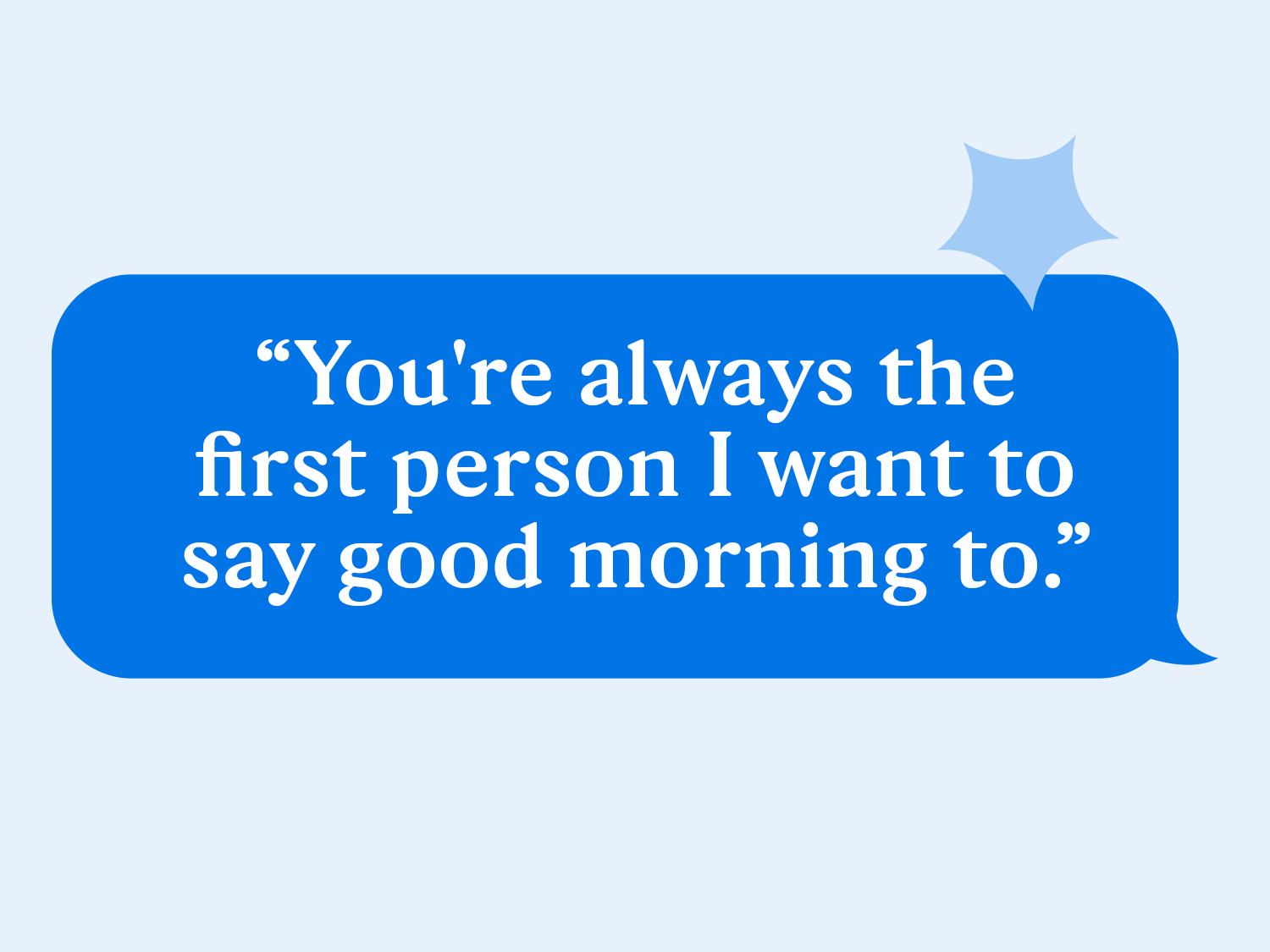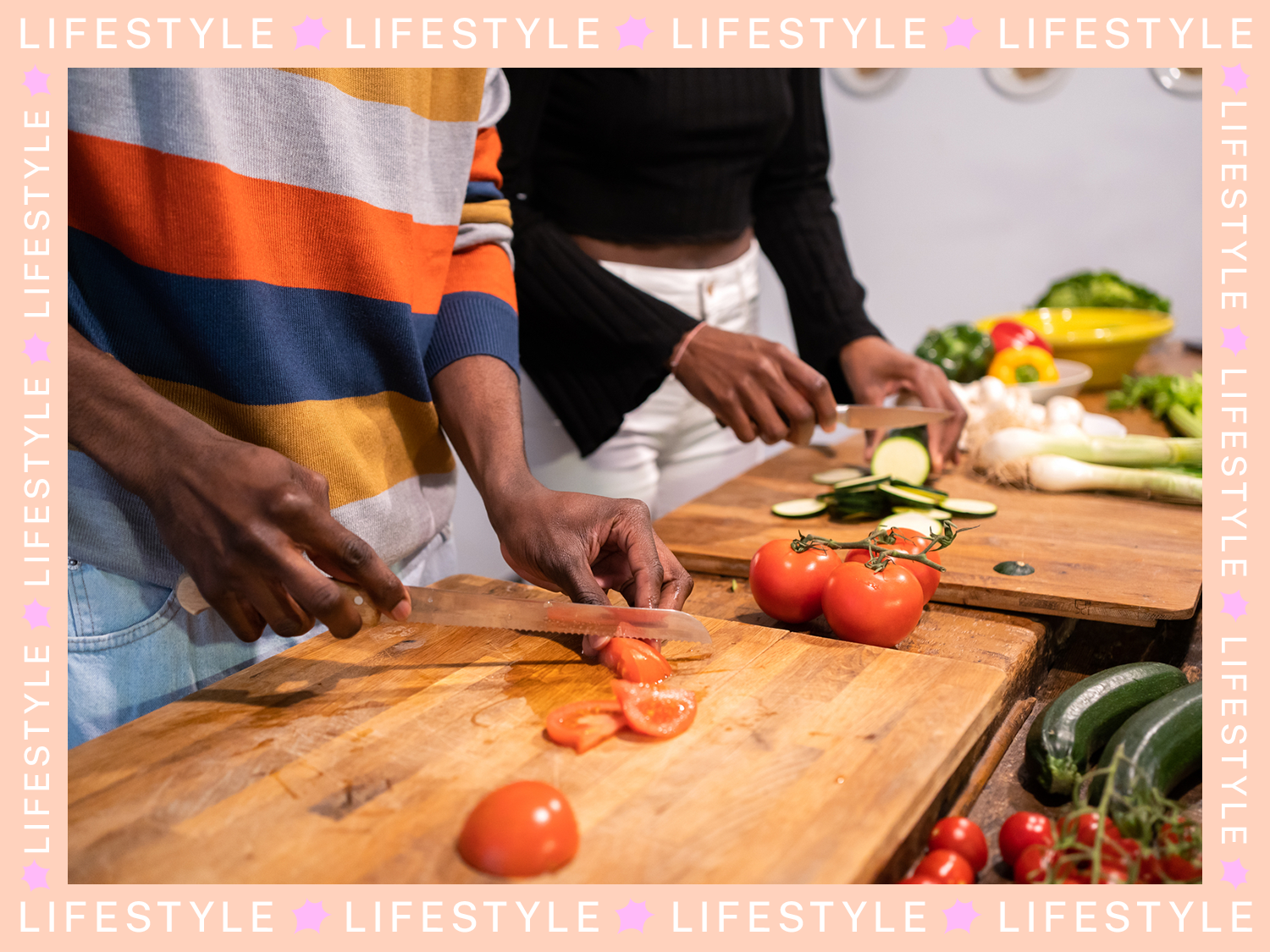10 Green Flags in Relationships You Should Embrace with Open Arms

Rude to restaurant staff? (Yikes!) Never texts back? (That's frustrating.) Overuses the word "literally?" (Annoying, but maybe not a deal breaker.) How about when they remember your favorite coffee order or send a good morning text just to make you smile? Now that's nice. While it's easy to get caught up in spotting red flags, let's flip the script and celebrate green flags that make your heart do a happy dance. Whether you're navigating dating apps or you're all partnered up, green flags are typically feel-good indicators that let you know you're on the right romantic path.
We explore the relationship green flags that real singles and couples swear by, as revealed in The Knot 2024 Relationship & Intimacy Study. To deepen our understanding of these green flags and their significance, we also turned to Michele Mopper (Levin), LPC, LCADC, ACS, Co-Owner of Blueprint Mental Health, for her expert insights.
In this article:
What Is a Green Flag In a Relationship?
Green flags in relationships are like green lights—they signal that it's safe to move forward and that you're on a promising path. "Think of [green flags] as signals from your mind and body that make you feel fully comfortable, interested, attracted and excited," says Mopper. These indications can come from personality traits, values, lifestyles and shared goals. In fact, Mopper says these regulators can make you feel good by literally keeping your nervous system calm. "They are crucial because they predict a successful and happy relationship," Mopper says.
Green Flags vs. Red Flags vs. Beige Flags
Green flags are positive signals of a promising and fulfilling relationship, but they're not the only type of relationship flag. According to Mopper, all flags—green, red, yellow and beige—are "signals to yourself and predictors of the relationship satisfaction potential." Green flags could include being an active listener who stays off their phone during conversations. They can also be associated with someone who maintains good hygiene or a tidy home (which may or may not include keeping their houseplants alive). For many, green flags often include being open to trying new things and supporting your interests.
Red flags are signs of dangerous or toxic characteristics, such as controlling behavior, dishonesty, consistent disrespect or love bombing. They're warning signals that should prompt you to listen to your instincts, discuss concerns with your partner or even end the relationship. Our research also dives into the red flags that respondents raised, including dishonesty and cheating.
In the middle are yellow flags. These are cautionary signs that suggest potential issues that might not be immediate deal breakers but could become problematic if not addressed. They often require attention and consideration. These could include inconsistent communication, avoiding serious conversations and having different relationship expectations.
Meanwhile, beige flags—a term that started on TikTok—can refer to traits or behaviors that aren't necessarily deal breakers but can be a bit odd or raise an eyebrow in a relationship. They don't indicate major problems like red flags, but they might make you pause and think, "Huh, that's interesting." Think: eating pizza with a fork—it's not bad, but it's quirky.
10 Relationship Green Flags To Fly High
While everyone values different things in a partnership, here are the top green flags that respondents said they look for when surveyed for The Knot 2024 Relationship & Intimacy Study. Conducted in April 2024, the survey collected responses from 1,009 US adults between the ages of 18-44, all of whom were single, casually dating or in a serious relationship; researchers also spoke to 1,003 adults married for 3 to 10 years. In short? Thousands of folks weighed in on their green flags in a relationship. Use this list to evaluate your current or future partner and maybe even see if you're a walking green flag yourself.
Honesty
Honesty is the cornerstone of trust and transparency in a relationship, so it's basically the foundation of a strong partnership. No wonder it was ranked as the most important attribute for a healthy relationship by those who are premarried and the second most important by those who are already married in The Knot's 2024 Relationship & Intimacy Study. In fact, a lack of trust and dishonesty were identified as reasons to end a relationship in the past, underscoring this relationship's green flag's vital role in maintaining a strong and lasting partnership. No cap.
Open Communication
Effective communication fosters a safe and trusting environment where both partners can express themselves freely, so being a good communicator definitely earns a green flag in a person. "Open and safe communication means that both people feel they can talk about uncomfortable things without facing anger, silent treatment or punishment," Mopper explains. You can gauge a partner's communication skills as early as the first date if they ask questions and genuinely listen. As the relationship deepens, observe if they handle deeper topics, like your religious and political values, with grace and openness.
If they don't, you might find yourself among the 59% of premarried individuals and 48% of married individuals who cite poor communication as a reason for ending a relationship. About two-thirds of both groups noted that regular communication and sharing feelings are strategies used to nurture intimacy, making this attribute especially crucial for maintaining a close and connected relationship.
Commitment
This might seem like a no-brainer, but individuals who are committed and loyal to their partner are keepers. It's not just about fidelity, although cheating was named as a dealbreaker (aka red flag) by 52% of premarried and 46% of married couples. Do they also stand by you through tough times and speak positively about you even when you're not around? Commitment ranked in the top five most important attributes for a healthy relationship by 59% of premarried respondents and 55% of married respondents. As they say, if you don't have trust, you don't have anything—knowing your partner is dedicated to the relationship and faithful to you helps combat insecurities and makes maintaining both a strong long-term partnership and a long-distance relationship much easier.
Effortless Enjoyment
All relationships take work and can be complicated at times. But when you step back and take a look at the partnership as a whole, if it often feels "easy" and your baseline is happiness and closeness, that's a great thing. According to our study, 76% of premarried respondents and 68% of married respondents said that finding someone who is easy and enjoyable to talk to was a key factor in choosing a partner. Asked in another way, having fun together was identified as the top sign of a healthy relationship by 55% of premarried respondents and 50% of married respondents.
To determine if you really enjoy spending time with your partner, look at your chemistry and their sense of humor. When considering a partner, these qualities are highly valued, taking second and third place, respectively, among premarried and married respondents. So, if your partner always has you grinning, even when you're not physically together, you're clearly onto something great.
Emotional Availability
Ranked as a top priority by 64% of premarried respondents and 47% of married ones, emotional availability was listed as one of the top factors to proceed to the next step in a relationship. For married couples, 31% pointed to emotional intimacy as the top indicator of a healthy relationship.
Premarried individuals also saw emotional intimacy as important, with just 5% prioritizing it first and 23% noting that a weak emotional bond resulted in a barrier to a satisfying sex life. Both groups agree that a willingness to seek professional therapy is a green flag in a partner. It's not just about sharing laughs; it's about being there for each other through life's ups and downs, expressing empathy and support. No one wants to be in a one-sided relationship, so when your partner is emotionally available, they're not just showing up—they're deeply engaged, making sure you both feel seen, heard and valued. Even if you're unsure if your partner has been emotionally intimate before, just their willingness to embrace it is a green flag that hints at an exceptional relationship in the making!
Future-Ready Ambition
We love a partner with a plan. Seventeen percent of premarried and 18% of married individuals identified a lack of career or aspirations as a dealbreaker in a relationship. And while money isn't everything, 43% of premarried and 36% of married respondents said financial stability (like being employed, having no debt, and maintaining a high credit score) is an important attribute for a relationship to progress to the next step. A person who is ambitious and has clear goals for their future shows motivation, foresight and a commitment to building a secure and successful life. And to be clear: we're not saying it's about how much money they have now or their longterm earning potential—it's about the drive for growth and their understanding that planning for the future is essential to building a strong relationship foundation. Plus, when someone is content and secure in their own life, it's much easier for them to bring happiness and stability into a relationship.
Shared Values
When partners share core beliefs and principles, navigating decisions and challenges becomes a breeze, as you both have a cohesive vision for the future. Examples of personal values include similar views on alcohol and substance use, work-life balance, family priorities and interests like exercise or healthy eating. No wonder 32% of married folks rank shared values as one of the top five must-haves in a relationship!
On the flip side, 21% of married respondents say differing beliefs—like their religious, social or political views—are major dealbreakers. Another 21% draw the line at conflicting views on kids or marriage. For singles and daters, 17% also flag differing opinions on children and marriage as a dealbreaker, while 16% call out differing beliefs in general. Alignment of these values helps clear up conflicts, boosts emotional bonds and deepens the partnership. In short, shared values keep you both on the same page, making building a smooth and lasting connection a lot easier.
Healthy Relationships Outside of Yours
Having healthy relationships with friends and family is a green flag that shouldn't be overlooked. When someone maintains strong, positive connections with the important people in their life, it shows they value communication, respect and emotional support—qualities that we've already noted are crucial in a romantic relationship as well. In fact, nearly a third of premarried survey takers and over a third of married respondents said that having a good relationship with their family was a must-have trait to see a relationship progress.
Likewise, 16% of premarried and 15% of married individuals mentioned that it would be a dealbreaker if their partner didn't have a good relationship with their own friends and family. Additionally, 14% of premarried and 12% of married respondents said conflict with their partner's friends and family is also a red flag. These connections give you a sneak peek into how they might nurture and sustain your relationship, showing how they manage boundaries, handle conflicts and express care. It can also suggest that they're independent, consistent in their words and actions and authentically themselves, having already earned the trust and respect of others.
Unconditional Support
A true green flag in people is demonstrating support for your partner. Not sometimes, not on a case-by-case basis—but truly unconditionally. This kind of support means they're in your corner no matter what, ready to cheer you on during your wins and lift you up during your lows. It's a sign that they believe in you, value your happiness and are committed to your growth without any strings attached. Unconditional support creates a safe space where both partners can thrive, knowing they have a reliable teammate in life. Among premarried individuals, 28% identified being supportive as the top attribute they seek in a healthy relationship. Meanwhile, 29% of married respondents ranked it as one of the top five traits essential for a healthy marriage.
Apologizes and Willingness to Compromise
A good indicator of a strong relationship is how well your partner handles conflict. If they're willing to apologize and compromise, it demonstrates their dedication to resolving issues and maintaining a sense of harmony. This ability to navigate disagreements with empathy and openness is crucial for long-term relationship success. In fact, 25% of premarried individuals identified a willingness to compromise as the top attribute they look for in a healthy relationship. Among married respondents, 29% ranked it as one of the top five essential traits for a thriving marriage.























